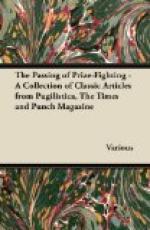(7) Would Jason, who sailed in the Argo, have laid an embargo on MARGOT as passenger or supercargo? Estimate the probable results of her introduction to Medea, and its effect on the views and translations of Professor GILBERT MURRAY.
(8) What eminent Georgian critic said that TENNYSON’s greatest work was his Idols of the Queen?
(9) Estimate the effect on Reconstruction if Mr. BOTTOMLEY were to devote himself exclusively to theological studies, and Mr. WELLS were to take up his abode permanently in Russia.
* * * * *
=Another Impending Apology.=
“FIRE AT CHILDREN’S
HOME.
LADY HENRY SOMERSET’S
WORK.”
Daily Paper.
* * * * *
From a Pimlico shop window:—
“GENTLEMEN’S WAR ROBES BOUGHT.”
Apparently not worth a “d.”
*
* * * *
“Professor ——,
the pianist, who is trying to complete 110 hours’
continuous playing, completed
fifty-five hours on the first day.”
Cologne Post.
That makes it too easy.
* * * * *
“Mme. Karsavina is taller
than Pavlova, but has an equally perfect
figure. The Greeks would
have bracketted her with Venus and
Aphrodite.”—Provincial
Paper.
The two last have, of course, been constantly bracketed.
* * * * *
[Illustration: Golfer (very much off his game). “ONE ROUND NEARER THE GRAVE.”]
* * * * *
OUR BOOKING-OFFICE.
(By Mr. Punch’s Staff of Learned Clerks.)
Not for a long time have I got so great a pleasure from any collection of short sketches as now from Miss ANNE DOUGLAS SEDGWICK’S Autumn Crocuses (SECKER). Not only has the whole book a pleasant title, but each of these stories is happily called after some flower that plays a part in its development. I am aware of the primly Victorian sound of such a description applied to art so modern as that of Miss SEDGWICK. You know already (I hope) how wonderfully delicate is her almost passionate sensibility to the finer shades of a situation. It is, I suppose, this quality in her writing that makes me still have reminiscent shivers when I think about that horrible little bogie-tale, The Third Window; and these “Flower Pieces” (as 1860 might have called them) are no whit less subtle. I wish I had space to give you the plots of some of them; “Daffodils,” for instance, a quite unexpected and thrilling treatment of perhaps the oldest situation of literature; or “Staking a Larkspur,” the only instance in which Miss Sedgwick’s gently smiling humour crystallizes definitely into comedy; or “Carnations,” the most brilliantly written of all. As this liberty is denied me you must accept a plain record of very rare enjoyment and take steps to share it.




